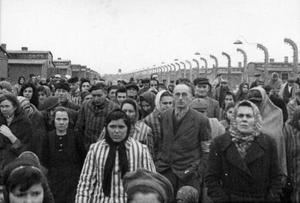 The Holocaust took place in Germany from 1933, when Adolf Hitler became Chancellor of Germany, and lasted until the end of WWII in 1945.
The Holocaust took place in Germany from 1933, when Adolf Hitler became Chancellor of Germany, and lasted until the end of WWII in 1945.
During this time, Jews in Europe were subjected to harsh persecution that ultimately led to the systematic murder of 6,000,000 Jews (1.5 million of these being children) and the destruction of 5,000 Jewish communities. These deaths represented two-thirds of European Jewry and one-third of world Jewry. The Jews who died were not casualties of the fighting that ravaged Europe during World War II. Rather, they were the victims of Germany’s deliberate and systematic attempt to annihilate the entire Jewish population of Europe.
Many of those that died during the Holocaust had purchased life insurance with such companies like Allianz and others. They paid their premiums to secure said coverage. Yet the death benefit of those policies has never been paid by the insurance companies.
Many of those insurance companies that are refusing to pay the life insurance proceeds actually even went so far as to actually cooperate with the German government during the Holocaust to insure death camps.
It is believed that companies such as Allianz, Generali, AXA and other global insurers wrote almost 900,000 insurance policies in Eastern Europe before the Holocaust. The amount owed on these policies has been estimated at $20 billion.
Yet, after the war ended many of the grieving families that had lost loves ones during the Holocaust submitted claims to the insurance companies. The insurance companies refused to honor the requests. Part of the reason was because many of the families were unable to provide death certificates. However, it is a known fact that the German government never issued any death certificate for those murdered during the Holocaust.
The International Commission on Holocaust Era Insurance Claims (ICHEIC) was established by the National Association of Insurance Commissioners in August 1998 to identify, settle, and pay individual Holocaust era insurance claims at no cost to claimants.
But the ICHEIC did not pay out the full benefits purchased by the life insurance policies. In some cases, they only paid a fraction of what was owed.
Contributions to reparations agreements are not a substitute for addressing the breach of contract that is the failure to pay legitimate claims of policyholders. As such, U.S. lawmakers are pushing through legislation that could potentially permit Holocaust survivors, and their families, the ability to sue for breach of contract, and other viable claims, and seek the full payment of amounts due and owing to the families of the many Holocaust victims and to others who may have viable claims.
—–
EXTENDED BODY:
Our Miami insurance dispute lawyers handle insurance claims for homeowners. Our attorneys represented insurance companies before 2006, when we opened a firm dedicated to fighting for the rights of consumers. We understand how insurance companies work. And we have the knowledge and experience necessary to represent homeowners in disputes over an insurance claim.